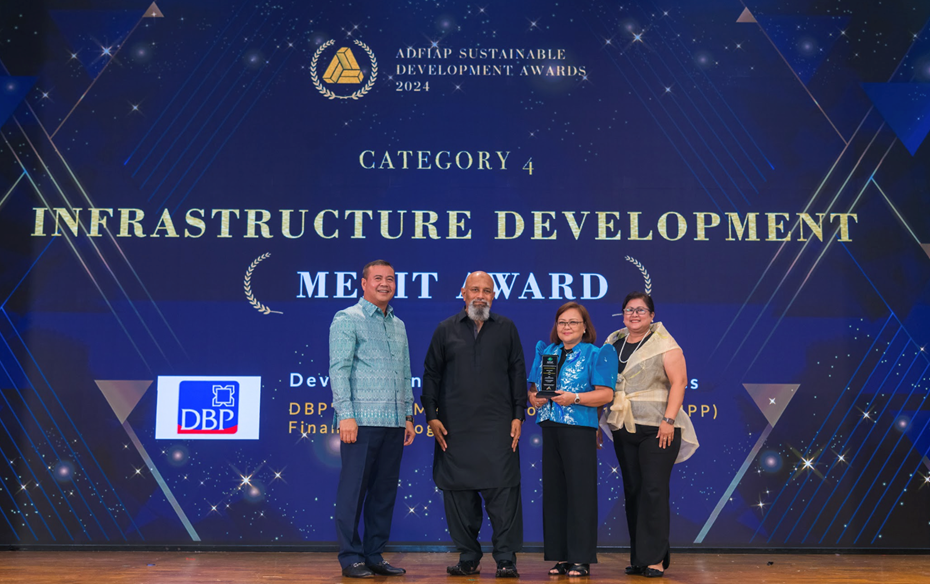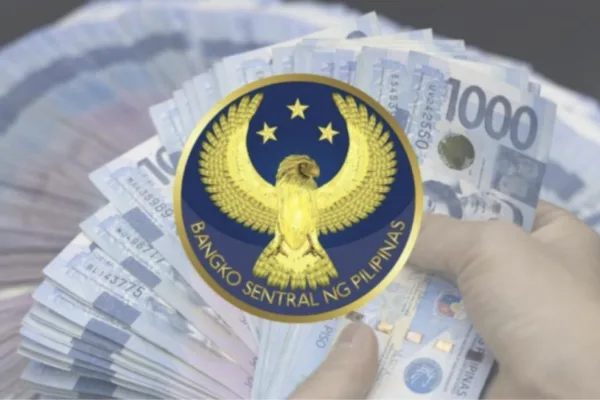The Development Bank of the Philippines (DBP), a state-owned institution, has recently been lauded by a prestigious international body for its innovative financing facility to propel the renewable energy sector, according to one of its top officials.
In a press release, DBP President and CEO Michael O. de Jesus announced that the Association of Development Financing Institutions in Asia and the Pacific (ADFIAP) awarded DBP the Merit Award for its Solar Merchant Power Plant (SMPP) Financing Program. This program is designed to support utility-scale solar power developers and stimulate investment in renewable energy projects.

DBP SVP Carolyn Olfindo (third from left) and DBP Vice President Raquel Atienza (right) receive the ADFIAP Merit Award for Infrastructure Development from ADFIAP 2nd Vice Chairman Kao Thach (leftmost) and Chairman Saud Minam (2nd from left) during the ADFIAP Sustainable Awards held in Cambodia.
“We are elated to receive this esteemed recognition from ADFIAP,” de Jesus said. “It underscores our relentless commitment to advancing President Ferdinand R. Marcos, Jr.’s vision of affordable and reliable energy through the promotion and utilization of renewable sources.”
Earlier this year, the state-owned bank also granted a PHP4-billion credit facility to the city government of Cabuyao in Laguna to support critical public infrastructure projects using renewable sources. According to de Jesus, the loan, which was approved under the bank’s Assistance for Economic and Social Development (ASENSO) for Local Government Units Financing Program, aims to enhance essential services in the areas of education, public health, access and mobility, disaster mitigation, and public security.
This multifaceted approach ensures that the city’s development is comprehensive and inclusive, touching on key aspects of urban living.
DBP continues to offer crucial credit support
Ranked as the 10th largest bank in the Philippines by assets, DBP offers crucial credit support across four key economic sectors: infrastructure and logistics; micro, small, and medium enterprises; environment; and social services and community development.
The ADFIAP, which represents 90 financial institutions across 40 countries in the Asia-Pacific region, holds annual awards to honor member institutions demonstrating exceptional dedication to sustainable development practices.
De Jesus highlighted that the SMPP Financing Program provides essential funding for solar power developers aiming to sell electricity through the Wholesale Electricity Spot Market. The financing supports eligible projects, including the construction and expansion of infrastructure facilities and the acquisition of machinery and equipment.
DBP anticipates that the SMPP Financing Program will significantly contribute to the National Government’s ambitious goal of generating 15,304 megawatts of power from renewable sources by 2030, as outlined in the National Renewable Energy Program.
“This recognition from ADFIAP further inspires the dedicated team at DBP to continue financing projects that harness the Philippines’ natural energy resources,” de Jesus added.
With this accolade, DBP cements its position as a leader in supporting the country’s transition to sustainable energy, reinforcing its role in shaping a greener and more resilient future.
More about DBP
In the Philippines, development financing institutions play a pivotal role in the quest for sustainable growth and development. At the helm of the country’s march toward progress is the Development Bank of the Philippines (DBP).
As the country’s pre-eminent development financial institution, DBP has taken upon itself the strategic task of influencing and accelerating sustainable economic growth, through the provision of resources, for the continued well-being of the Filipino people.
The DBP, under its new charter, is classified as a development bank and may perform all other functions of a thrift bank. Its primary objective is to provide banking services principally to cater to the medium and long-term needs of agricultural and industrial enterprises with emphasis on small and medium-scale industries.







